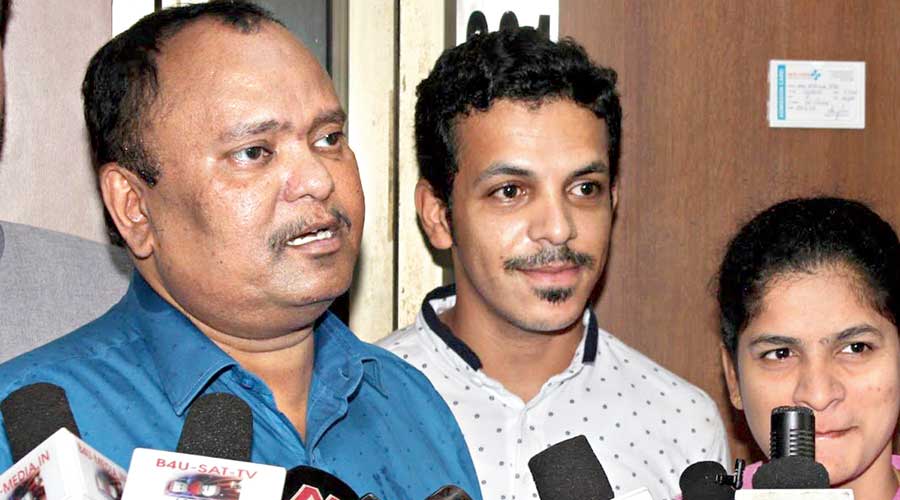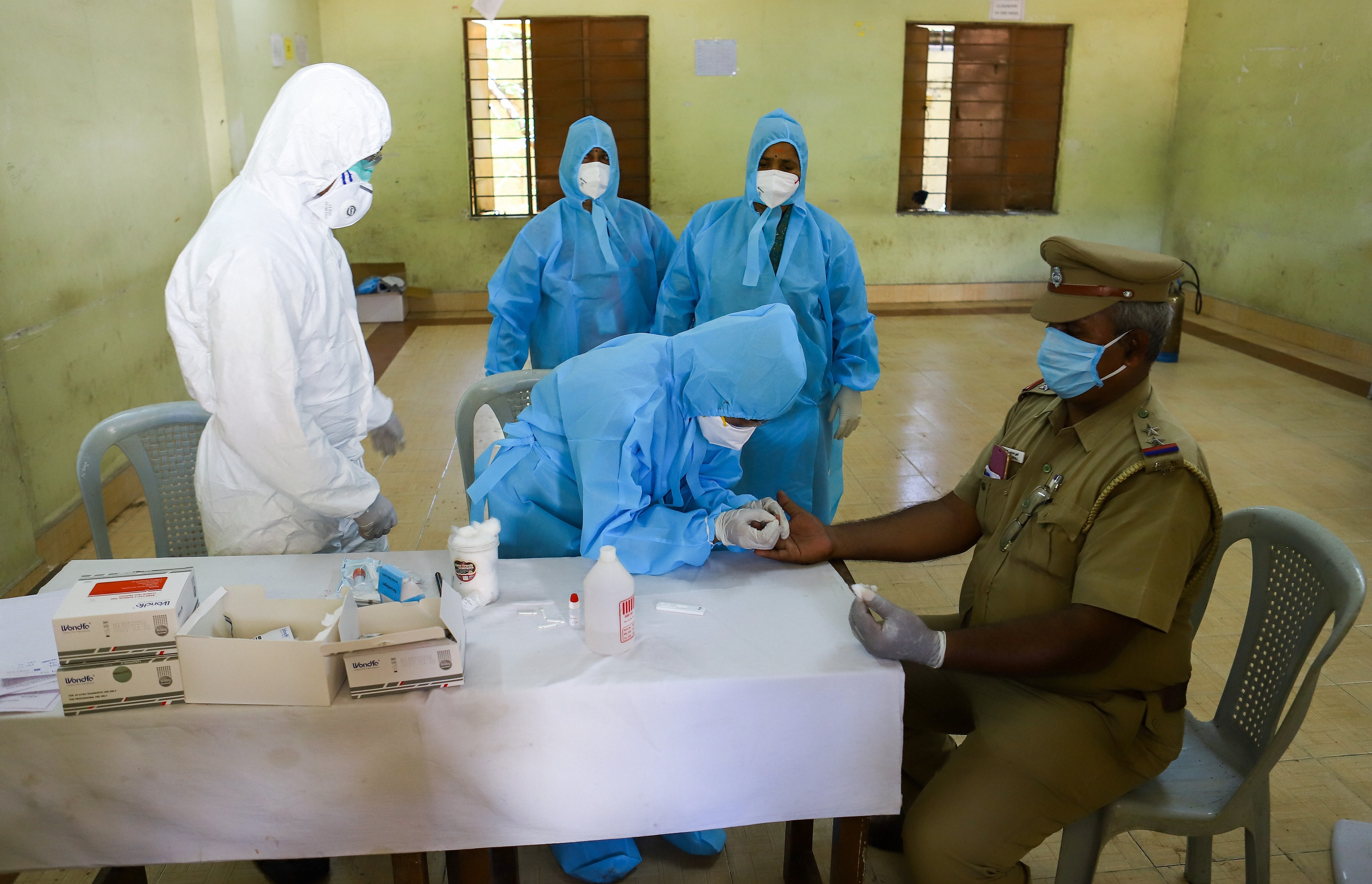Dr Simon Hercules’s body was placed in a coffin and he was laid to rest at the Kilpauk Christian Cemetery in Chennai this Sunday in the presence of his wife and children — one year and three months after he succumbed to Covid.
Dr Hercules had passed away on April 19, 2020. But some residents, fearful of contracting the coronavirus infection, chased away the hearse from multiple burial grounds. Eventually, with the help of police, some of his colleagues had themselves prepared a grave in the dead of night and buried the doctor at a cemetery near the fringes of the city.
A year-long legal battle waged by the neurosurgeon’s wife Anandhi Simon, a favourable verdict from Madras High Court and the intervention of new Tamil Nadu chief minister M.K. Stalin ensured that Dr Hercules’s body was exhumed and was given a formal burial at the Kilpauk Christian Cemetery on July 25 this year in keeping with Anandhi’s wish.
This time, there were no protests or angry mobs stalling the last rites — a year of living with the coronavirus had helped jettison many of the unsubstantiated fears that had marked the initial days of the pandemic.
“We are relieved that science has prevailed at last…,” Dr G. Leonard Ponraj, a sports medicine specialist and a colleague of Dr Hercules who stood by the bereaved family through the crisis, told The Telegraph.
Dr Hercules, the director of New Hope Brain and Spine Centre in Chennai, had breathed his last at a private hospital last year after a two-week battle with Covid, the first case of a medical practitioner dying of the disease in the Tamil Nadu capital.
Clearing the way for his re-burial, Madras High Court had said on March 31 this year that Dr Hercules’s case was a “shocking one as the incident had given a go-by to all human values”.
Justice Abdul Quddhose wrote in his judgment: “The corpse of Dr Simon Hercules was shunted from one burial ground to another due to objections raised by heartless human beings to the burial of a Covid-19 victim.”
On the night of April 19, 2020, the Greater Chennai Municipal Corporation had initially told Dr Hercules’s family and colleagues that he could be laid to rest at the burial ground at T.P. Chatram. But when they reached there, they were gheraoed by an angry crowd that objected to the burial of a Covid patient over fears that it could lead to the spread of the virus.
Dr Hercules was then taken to the burial ground at Velangadu, where around 150 people gathered and attacked the ambulance with sticks and stones, forcing those accompanying the body to abandon it briefly. The crowd beat up and injured the ambulance driver and at least two hospital employees and forced the family to leave with the body. Multiple phone calls to the police did not help.
Two hours later, when colleague and orthopaedic surgeon Pradeep Kumar heard from the police that the crowd had been controlled, the family and four of Dr Hercules’s colleagues set off for the Velangadu burial ground again in the damaged ambulance with police escorts.
Wearing personal protective equipment, they prepared a grave and with the help of a single shovel left behind, they covered it with clay and soil.
The treatment meted out to a doctor amid the pandemic had shocked the medical community and sparked outrage on social media. The police later arrested several persons for the violence.
A day after Dr Hercules’s death, Anandhi requested the Greater Chennai Municipal Corporation that the body be exhumed and buried again at the Kilpauk Christian Cemetery in line with the family’s faith. The civic body rejected the plea on the ground that the process could lead to the spread of the virus and trigger similar demands from other bereaved families.
Anandhi moved Madras High Court, citing her religious beliefs and urging it to direct the authorities to allow the exhumation and re-burial of Dr Hercules’s body.
The court quashed the municipal corporation’s order. It cited various Supreme Court and high court rulings, including a recent judgment of Calcutta High Court on disposal of bodies that upheld the right of the “family of a Covid victim to perform the last rites as a right akin to a fundamental right”.
Justice Quddhose extensively cited guidelines of the Union health ministry and WHO on the disposal of bodies of pandemic victims that clearly state that “transmission of Covid-19 is only through droplets” and that the possibility of infection spread through handling of bodies was unlikely.
The court directed the civic authorities to allow the re-burial of Dr Hercules at the Kilpauk cemetery by observing all safety norms.
However, the then commissioner of the municipal corporation appealed to a larger bench of the high court and got Justice Quddhose’s order stayed.
“After the new DMK government took over earlier this year, we approached chief minister M.K. Stalin,” said Dr Ponraj, the colleague of Dr Hercules.
“We told Stalin that there is a science behind this and that the previous corporation commissioner was ill-informed,” Dr Ponraj said.
The chief minister directed the new corporation commissioner to withdraw the civic body’s appeal in the high court on July 20.
Early this Sunday, Ananthi, her children, Dr Ponraj and others oversaw the exhumation of Dr Hercules’s body at the Velangadu burial ground. A JCB was pressed into service at 5am and within half an hour, the body was exhumed.
The body was more or less intact as it had been packed in the “extra-thick triple layer plastic bags” used for Covid victims.
Dr Hercules’s body was then placed in a coffin and taken to the Kilpauk cemetery where the re-burial went off without any hurdles.
Dr Hercules’s family has thanked chief minister Stalin for his intervention.
“I do not blame the former corporation commissioner, for he had not been adequately sensitised by experts. Today, bodies of Covid victims are even allowed to be taken home because there is greater awareness. We are relieved that science has prevailed at last and there is no politics to this,” Dr Ponraj said.












